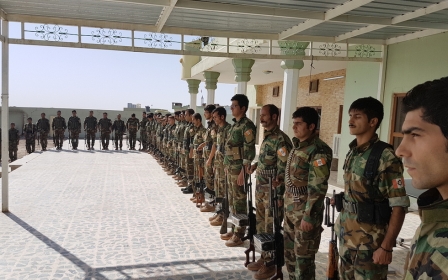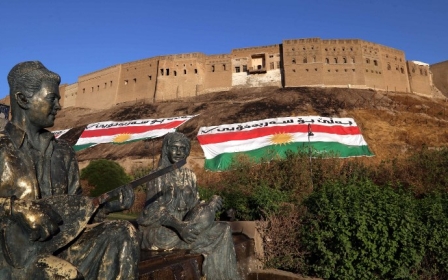Barzani expects no conflict with Baghdad, but no going back for Kurds

ERBIL, Iraq - Iraqi Kurdish President Massoud Barzani said he did not expect conflict with Baghdad following the referendum and that it would just mark the beginning of a "long process" of negotiations.
Speaking at a press conference in Erbil on the evening of the referendum vote, Kurdistan Regional Government (KRG) President Barzani said that despite harsh words from Iraqi Prime Minister Haider al-Abadi there was no chance of violence.
"We don't expect any kind of military conflict with Iraq," he told reporters.
We don't expect any kind of military conflict with Iraq
- Massoud Barzani, Iraqi Kurdish region's president
"That kind of thought doesn't even cross our mind."
He emphasised that the referendum would not establish facts on the ground, but would be a platform for discussion with the government in Baghdad.
"The referendum is the first step that the people of Kurdistan decide what they want in future and how they want to live," he told reporters. "After that, we start a very long process.
"This referendum is not to draw the border of Kurdistan - this referendum is not to impose any status quo on any area, and after the referendum we are ready to start the long process of dialogue with Baghdad."
However, he emphasised the Kurds were "never going back to Baghdad to renegotiate the failed partnership we had in the past".
The international community has repeatedly called for Erbil to cancel the 25 September referendum, called by Barzani in June, fearing it could lead to increased instability in the region.
Iran and Turkey have been particularly vocal in their opposition to the referendum, over concerns that it could spark unrest in their own Kurdish populations.
The Turkish government, otherwise a close ally of the KRG, has threatened to close the border with the region over the poll, which has enraged nationalists who fear it could lead to similar demands from Kurds in Turkey.
The UN, US, UK and EU have also called for the referendum to be delayed or cancelled and for Erbil to resume negotiations with Baghdad.
There has also been controversy over the extent of the remit of the referendum, which includes a number of disputed areas including Sinjar and Kirkuk.
Kirkuk has been controlled by Kurdish forces since clashes with the Islamic State group in 2014. Kurds claim the multi-ethic city, which includes Kurds, Arabs and Turkmen, as their cultural capital, and armed groups have warned they will not allow the city to return to Baghdad's control without a fight.
Abadi has also warned that Iraq would have to "intervene" militarily if Iraqis were threatened with violence following the referendum.
'Inherent right to self-determination'
Barzani condemned Iraq for becoming a "theocratic, sectarian state" and said they had rejected attempts to mend relations.
"We tried our best to find a solution to these problems in Iraq with Baghdad, with the international community and, indeed, Baghdad didn't accept us and they obliged us to take this step that we've taken already," he said.
In a pack distributed at the conference, Barzani outlined the legal arguments for Kurdish independence, arguing that successive Iraqi government's had violated the rights of the Kurds as a people.
"Kurdistan's inherent right to self-determination does not depend on the future of Iraqi conduct," read the report, which Barzani said had been approved by the referendum committee.
"Nevertheless, Iraq's past, since it's formation by the British Empire, is a catalogue of violations of the people of Kurdistan's rights as a nation, as a people with a distinct language, ethnicity and ethos of its own, culminating in episodes of coercive assimilation, ethnic expulsion and genocide."
During the process of Saddam Hussein's Anfal campaign of 1988, more than 180,000 Kurds were killed, culminating the in the Halabja massacre in which more than 5,000 people were killed by chemical weapons.
"When we had the Anfal campaign and the chemical bombardment of our people, we had not been asking for referendum at that time," said Bargain, speaking to reporters.
"Only through independence can we secure our future and we are not going to have the past atrocities that we had previously."
Although the referendum vote is expected to pass, some critics have accused Barzani of calling the vote in order to stoke nationalist sentiment ahead of parliamentary elections.
Most political parties in the Kurdistan parliament have supported the poll, but the second-largest party, Gorran, has criticised the calling of the referendum, labelling it "illegal".
Barzani called on Kurds voting on Monday to "keep their calm" and to "abide by all the instruction from the electoral commission".
This article is available in French on Middle East Eye French edition.
Stay informed with MEE's newsletters
Sign up to get the latest alerts, insights and analysis, starting with Turkey Unpacked
Middle East Eye delivers independent and unrivalled coverage and analysis of the Middle East, North Africa and beyond. To learn more about republishing this content and the associated fees, please fill out this form. More about MEE can be found here.




